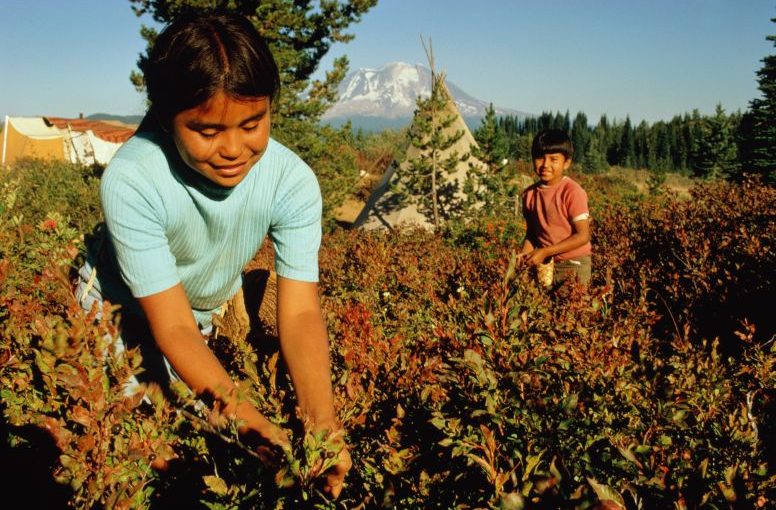Nutritious food is essential for any community to function. The capitalist commodity food system that functions practically worldwide creates uneven access, hunger, health problems, and poverty. Food Sovereignty, a term coined by La Via Campesina at the World Food Summit in 1996 is a movement rooted in peasant, landless, small and medium scale farmers and indigenous resistance of capitalist corporate control of the food system. Food Sovereignty functions in defense of small-scale sustainable agriculture and the right of people to have access to healthy, culturally appropriate foods. Since La Via Campesina’s foundation in 1993, it has become one of the largest social movements in the world, bringing together more than 200 million small and medium scale farmers, women farmers, indigenous peoples and migrant agricultural workers from 70 countries.
The Seven Principles of Food Sovereignty are:
1. Food: A basic human right,
Everyone must have access to safe, nutritious and culturally appropriate food in sufficient quantity and quality to sustain a healthy life with full human dignity. Each nation should declare that access to food is a constitutional right and guarantee the development of the primary sector to ensure the concrete realization of this fundamental right.
2. Agrarian reform
A genuine agrarian reform is necessary which gives landless and farming people — especially women — ownership and control of the land they work and returns territories to indigenous peoples. The right to land must be free of discrimination on the basis of gender, religion, race, social class or ideology; the land belongs to those who work it.
3. Protecting Natural Resources
Food Sovereignty entails the sustainable care and use of natural resources, especially land, water, and seeds and livestock breeds. The people who work the land must have the right to practice sustainable management of natural resources and to conserve biodiversity free of restrictive intellectual property rights. This can only be done from a sound economic basis with security of tenure, healthy soils and reduced use of agro-chemicals.
4. Reorganizing Food Trade
Food is first and foremost a source of nutrition and only secondarily an item of trade. National agricultural policies must prioritize production for domestic consumption and food self-sufficiency. Food imports must not displace local production nor depress prices.
5. Ending the Globalization Of Hunger
Food Sovereignty is undermined by multilateral institutions and by speculative capital. The growing control of multinational corporations over agricultural policies has been facilitated by the economic policies of multilateral organizations such as the WTO, World Bank and the IMF. Regulation and taxation of speculative capital and a strictly enforced Code of Conduct for TNCs [Trans-National Corporations] is therefore needed.
6. Social Peace
Everyone has the right to be free from violence. Food must not be used as a weapon. Increasing levels of poverty and marginalization in the countryside, along with the growing oppression of ethnic minorities and indigenous populations, aggravate situations of injustice and hopelessness. The ongoing displacement, forced urbanization, repression and increasing incidence of racism of smallholder farmers cannot be tolerated.
7. Democratic Control
Smallholder farmers must have direct input into formulating agricultural policies at all levels. The United Nations and related organizations will have to undergo a process of democratization to enable this to become a reality. Everyone has the right to honest, accurate information and open and democratic decision-making. These rights form the basis of good governance, accountability and equal participation in economic, political and social life, free from all forms of discrimination. Rural women, in particular, must be granted direct and active decision making on food and rural issues.
Though the need to connect with the land is by no means a new sentiment in this hyper-industrialized age, groups of indigenous people’s worldwide have taken action to revitalize their own rich cultural traditions and farming practices. For Native people across the America’s, conquest caused the loss of homelands, culture, language, and ancient wisdom among other terrible losses. Through conquest, many tribes lost touch with their traditional eating ways and fatty, salty government rationed foods took over, causing terrible outcomes for tribal health.
Good food is essential. When we talk about food systems we often talk about food security- having enough food- but beyond having enough it is essential to acknowledge and value indigenous food-related knowledge and wisdom to promote community mobilization and sustenance. At this point in time, reconnecting to land, rediscovering growing practices and revitalizing cultural traditions and attempting to reverse the unhealthy eating that has resulted from the loss of land and rights is essential in the physical and mental health of tribal nations.
Here is a short list of Tribal groups across the country working towards Food Sovereignty and increased understanding and appreciation of their own native food practices:
- Muckleshoot Food Sovereignty Project – Auburn, WA
- NW Native Plants and Food Collective – Bellingham, WA
- Northwest Indian College Traditional Plants and Foods – Bellingham, WA
- Native American Food Sovereignty Alliance (NAFSA) – Nation Wide
- Mvskoke Food Sovereignty Initiative – Okmulgee, OK
- White Earth Land Recovery Project – White Earth, MN
- Native Food Systems Resource Center – Longmont, CO
- Native Food Network – Madison, WI
- Traditional Native American Farmers Association – Arizona
- Tohono O’odham Community Action – Sells, Arizona
- New Mexico Indigenous Producers – NM
- Natwani Coalition – Kykotsmovi, AZ
